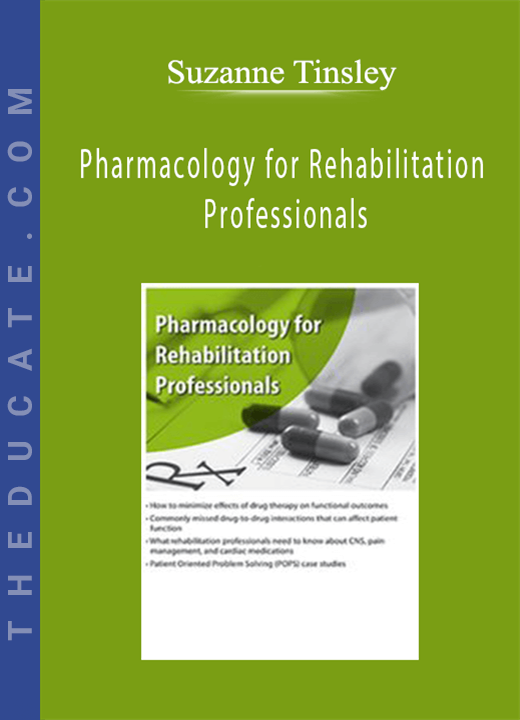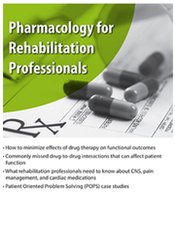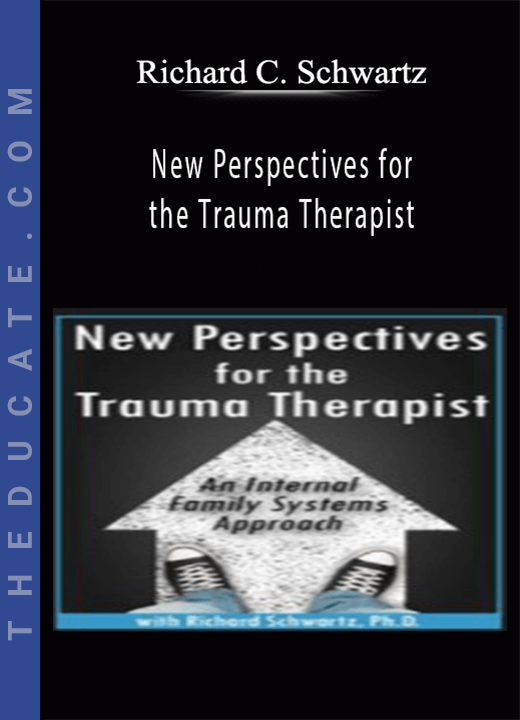Description
-
Suzanne Tinsley – Pharmacology for Rehabilitation Professionals
- Faculty:
- Suzanne Tinsley
- Duration:
- 5 Hours 52 Minutes
- Format:
- Audio and Video
- Copyright:
- May 18, 2017
- Pharmacokinetic principles
- Pharmacodynamics principles
- Their importance to rehabilitation
- Common CNS drugs seen in rehabilitation
- Sedative-hypnotics, anti-seizure meds, anti-depressant meds, Parkinson’s disease meds, etc.
- Side effects and rehabilitation outcomes
- Advantages and disadvantages of each class
- Common side effects and their effect on rehabilitation outcomes
- Signs and symptoms of abuse
- 5 classes of cardiac medications
- Beta blockers, calcium channel blockers, ACE inhibitors, diuretics, & glycosides
- How these drugs are combined to treat cardiac disease/pathology
- Therapeutic effects and side effects that may interfere with rehabilitation outcomes
Description
Understand How Your Patient’s Medications Affect Functional Outcomes
Many patients being referred to therapy are taking prescription and/or over-the-counter medications. Although many of these medications are directly related to their therapy diagnosis, some may not be. What should you know about clinical pharmacology to manage them effectively?
In this recording, rehab pharmacology expert, Dr. Suzanne Tinsley, examines the critical aspects of pharmacology, including the principles of pharmacodynamics and pharmacokinetics as well as how to apply these concepts to all drug classifications. You will discuss specific concepts of the pharmacology of the central nervous system and autonomic nervous system. You will analyze effects of drug actions on the major body systems, including mechanisms of therapeutic actions and adverse drug effects, problems involving drug interactions, and variables that modify drugs’ effects. Special consideration will be given to many of the drugs most commonly used in treating cardiovascular and neuro-musculoskeletal disorders. Using case reports, you will uncover specific effects that have an impact on the rehabilitation management of patients and clients.
Handouts
| Manual – Pharmacology for Rehabilitation Professionals (13.60 MB) | 172 Pages | Available after Purchase |
Outline
PRINCIPLES OF PHARMACOLOGY
PHARMACOLOGY OF THE CENTRAL NERVOUS SYSTEM
PATIENT ORIENTED PROBLEM SOLVING (POPS) CASE STUDY
PAIN MANAGEMENT – NARCOTICS, NONSTERIODAL, ANTI-INFLAMMATORY DRUGS
CARDIAC MEDICATIONS
POPS CASE STUDIES
Faculty
Suzanne Tinsley, PhD, PT, NCS Related seminars and products: 1
Suzanne Tinsley, PhD, PT, NCS, is an Associate Professor in the Departments of Rehabilitation Sciences and Neurology and the current holder of the Charles R. Parks Endowed Professorship at Louisiana State University Health Sciences Center-Shreveport, where she teaches medical pharmacology and neuroscience in the School of Allied Health Professions. A Board Certified Neurologic Physical Therapist, Dr. Tinsley has presented both internationally and nationally on the topics of pharmacology and neurologic rehabilitation. She has also served on the ABPTS Academy of Content Experts.
Dr. Tinsley received her Master’s in Physical Therapy from Texas Woman’s University in 1986 and her PhD in Neuropharmacology from Louisiana State University Health Sciences Center-Shreveport in 1999. She has published on pharmacology and rehabilitation and is an author of a pharmacology textbook for McGraw-Hill Publishing. She has an active clinical practice in the area of neurological rehabilitation as well as an active clinical research agenda. Dr. Tinsley has been honored as a Visiting Scholar at the renowned Valens Rehabilitation Clinic in Valens, Switzerland.
Speaker Disclosures:
Financial: Suzanne Tinsley is the assistant dean at LSU Health Sciences Center – Shreveport. She is an author for McGraw Hill Publishing and receives a royalty. Dr. Tinsley receives a speaking honorarium from PESI, Inc.
Non-financial: Suzanne Tinsley has no relevant non-financial relationship to disclose.







5 reviews for Suzanne Tinsley – Pharmacology for Rehabilitation Professionals
There are no reviews yet.